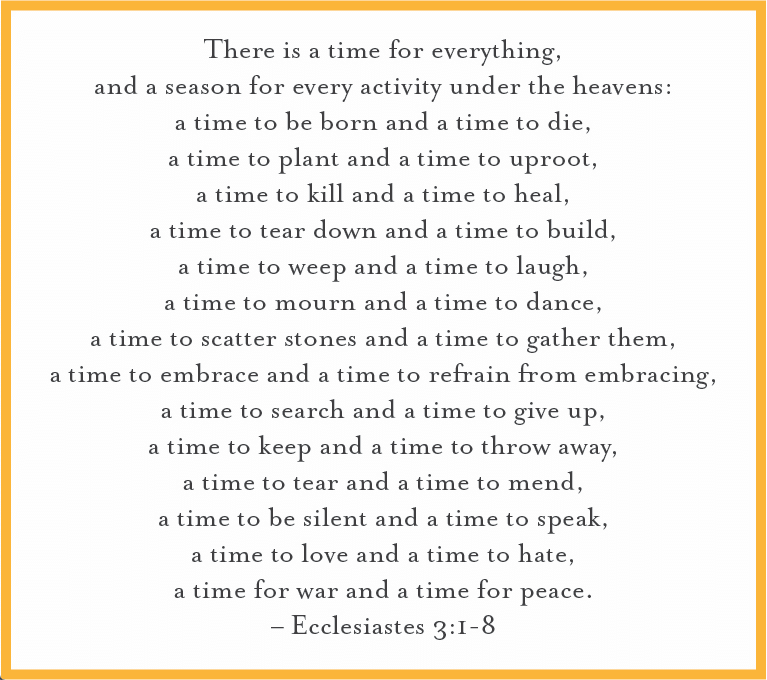
Necessary Endings
This article is found in the Betenbough Companies Leader’s Guide and includes excerpts from Dr. Henry Cloud’s book Necessary Endings.

In our business and our life, the tomorrow that we desire may never come to pass if we do not end some things we are doing today. Endings are not a tragedy, but a natural part of the universe, and our life and business must face them, stagnate, or die. To get to the next level and often even to sustain their companies’ current level of health, leaders must shut down yesteryear’s good ideas, strategies, or involvements in order to have the resources and focus to take their organizations to tomorrow. Sometimes it means employees have to be let go too.
Some endings are not a next natural step but are just as necessary. We wish they weren’t, but they are. They come about not in the pursuit of growth, but because something has gone wrong.
In both normal life and life gone wrong, ends are a necessity. A message in Ecclesiastes says there is a season for things to begin and a season for things to end, and that’s how life works. We may have read this passage before, but focus on the prevalent role of endings throughout:

Endings are not only a part of life; they are a requirement for living and thriving, professionally and personally. Death is the first step to real life, at least that’s the way Jesus saw it. Being alive requires that we sometimes kill off things in which we were once invested, uproot what we previously nurtured, and tear down what we built for an earlier time. Endings are the reason you aren’t married to your prom date or still working at your first job. But without the ability to do endings well, we can flounder, stay stuck, and fail to reach our goals and dreams.
The Key To Growing Beautiful Roses:
If you’ve ever seen a healthy rosebush with its vibrant, fully mature blooms, you know the admiration that the one who nurtured that beauty deserves. But there is a method behind the beauty. It is called pruning. Pruning is the process of proactive endings. It turns out that a rosebush, like many other plants, cannot reach its full potential without a systematic process of pruning. The gardener intentionally and purposefully cuts off branches and buds that fall into any of three categories:
1. Healthy buds or branches that are not the best ones.
Rosebushes and other plants produce more buds than the plant can sustain. The plant has enough life and resources to feed and nurture only so many buds to their full potential; it can’t bring all of them to full bloom. In order for the bush to thrive, a certain number of buds have to go. The caretaker constantly examines the bush to see which buds are worthy of the plant’s limited fuel and support and cuts the others away. The plant wouldn’t be able to produce full, mature blooms without pruning. Without the endings, you’d never get the best roses.
2. Sick branches that are not going to get well.
While the gardener may monitor, fertilize, and nurture diseased branches, he realizes that more water, more fertilizer, or more care is just not going to help. For whatever reason, they are not going to recover and become what he needs them to be to create the final picture of beauty he wants for the bush in the garden. These are the next go. As a result, the bush now has even more fuel to pour into the healthy buds. The plant is now fully on mission, focusing its energy every day on feeding and growing the buds that are destined to reach full bloom and maturity.
3. Dead branches that are taking up space needed for the healthy ones to thrive.
The healthy branches need room to reach their full length and height, but they cannot spread when dead branches force them to bend and turn corners. To give healthy blooms and branches room and an unobstructed path to grow, the dead ones are cut away.
Pruning enables rosebushes to realize full potential. Without it, they are just average at best and far less than they were designed to be. If you think about it, there should never be an average rosebush. By nature, there is nothing average about them at all. They are designed for incredible beauty and lushness. But if not adequately pruned, they never make it. And like rosebushes, your business and your life also need the same three types of pruning to be all that you desire.
Endings are a normal occurrence, and a normal part of business and life. They shouldn’t be seen as a problem. Have the courage to admit when more effort will not bring about a different result. We have seen the scene in movies when the patient dies, the doctor looks up at the clock, quotes the time of death, breathes a heavy sigh, pulls off her gloves, and walks out the door. The doctor has done everything in her power to avoid this outcome, but when the monitor goes into a steady beep, she accepts what is normal, albeit unwanted, and moves on to try to save the next life. Likewise in business and life, there comes a moment when that reality must be seen and grasped.
These four questions can help you see reality. They are great questions for a team to ask itself about key people decisions, as well as specific strategies and or projects:
1. What has the performance been so far?
2. Is it good enough?
3. Is there anything in place that would make it different?
4. If not, am I willing to sign up for more of the same?
In our organization especially, we strive to show grace and be hopeful, but there is a big difference between hoping and wishing. Hope comes from a real, objective reason that the future is going to be different from the past. Anything other than that is simply a wish that comes from your desires. We must honestly ask ourselves, “What in the picture is changing that I can believe in?” Is there additional training or new knowledge we could introduce? Is there some structure or support we could put in place to help them make the change? Would we increase the odds of success if we tapped into professional coaching, counseling, or know-how?
How do we know when to have hope? To have hope that people are going to change, we must have admission from them that they really NEED to change. They must see that they have a problem and own the problem. We should also look at the degree to which we are having to drive the process. They should demonstrate a hunger to make tomorrow different through their own self-sustaining motivation.
Change takes time, but there should be movement and progress that can be seen. Something should be happening, even if they aren’t to the end result yet. When there is no progress and nothing specific we can point to that causes us to be hopeful, we’re simply being wishful in a hopeless situation. Necessary endings should come when there is real hopelessness. But this pruning moment is one of the best places we can get to, because it will fuel change and a better tomorrow.
For more information, check out these related posts by clicking on the pictures below. Also, click HERE for more information on our Kingdom At Work Coaching efforts!


